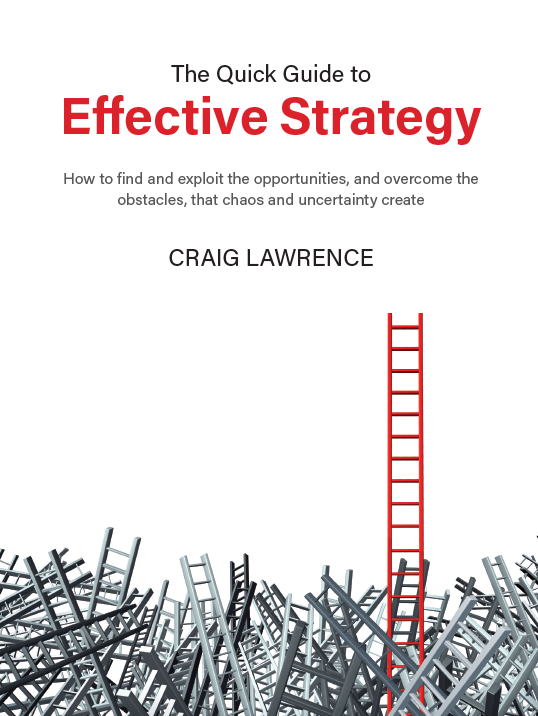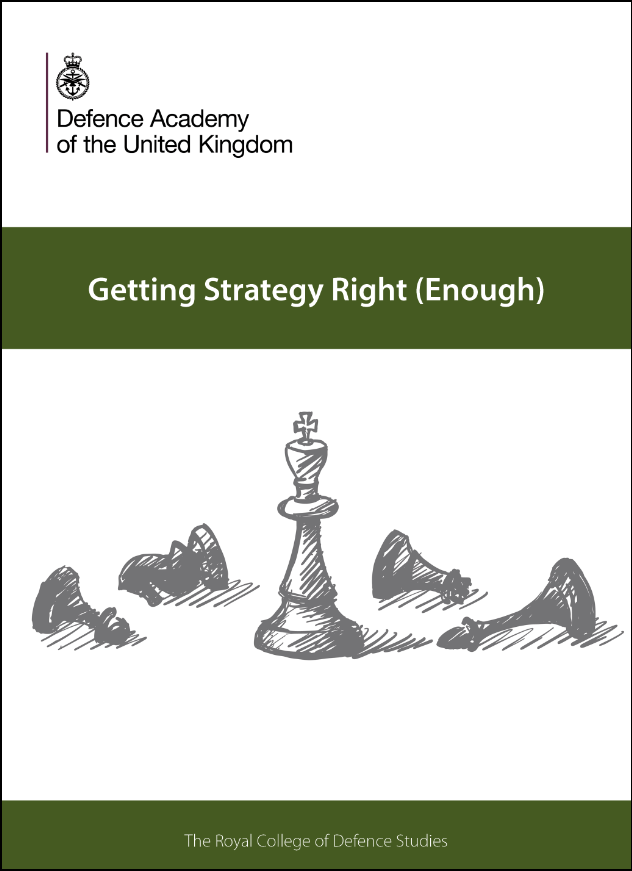About Craig Lawrence CBE
Principal strategy consultant, Founder and Managing Director of Craig Lawrence Consulting Limited, and author of The Quick Guide to Effective Strategy
Craig Lawrence: Founder and Managing Director of Craig Lawrence Consulting Limited
Craig Lawrence CBE has a proven record of developing collaborative strategies that exploit opportunities to deliver outstanding results. He set up Craig Lawrence Consulting because he was struck by just how many organisations struggle to do the same. His consultancy works across multiple sectors, helping organisations to develop effective strategies and refine their high-level leadership skills. See our services at this link.
Craig is a Senior Research Fellow with RAND Europe and a Fellow of both the Chartered Management Institute and the Institute of Consulting. He is also the author of six books, two about strategy and strategic leadership, two Gurkha histories and two action adventure thrillers. You can find out more about his books on his Amazon author page.
The sections that follow introduce readers to Craig’s new book, The Quick Guide to Effective Strategy, and then explains a bit more about Craig’s background and why he is so well placed to help clients develop highly effective strategies.

The Quick Guide to Effective Strategy
Most strategy books introduce you to lots of different tools, techniques and methodologies that can be used to analyse almost everything. The problem is that they don’t explain how to apply them in a sequence that starts with confirming whether you need a strategy and, if you do, what you want it to achieve, and ends with a completed strategy that you can implement and then adapt as circumstances change (which they inevitably will). This book is different because that’s exactly what it does.
Based on fourteen critical thinking questions dispersed over five thematic stages, the proven methodology described in the book is entirely scalable. This means it works when you only have a few hours to decide how you’re going to react to a rapidly unfolding situation and when you have the luxury of more time to develop your strategy.
Using examples from across the public, private and third sectors, the book provides an invaluable handrail for entrepreneurs, company directors (executive and non-executive), charity trustees, school governors and anyone else who wants to understand how to develop an effective strategy, one that exploits the opportunities and overcomes the obstacles that today’s increasingly chaotic and uncertain environment creates. You can find out more about the book here.

The Royal College of Defence Studies (RCDS), London
From 2018 – 2020, Craig was the Course Director of RCDS, the UK’s leading provider of postgraduate education in the fields of strategy and strategic leadership. Whilst there, he transformed the College’s flagship course into a ‘must do’ career enhancer for a cohort of more than 500 senior executives. Many of these are now destined to reach the highest ranks of their international organisations. From 2016 – 2018, Craig was the Director of Strategy and Strategic Leadership. He led the teaching, and continual adaptation, of the College’s approach to strategy-making, as well as its strategic leadership programme. He was also the author of the College’s seminal guide to strategy-making, Getting Strategy Right (Enough).

Getting Strategy Right (Enough)
Getting Strategy Right (Enough) was published on 4 September 2017. The guide aimed to “…summarise the art and science of strategy-making and implementation in a handy format.” Many departments across the UK Government still use the guide to help them develop effective strategies.
Importantly, the guide includes many of the lessons identified in the ‘Chilcot Report.’ This was an exhaustive inquiry into the deployment of the UK’s armed forces to Iraq in 2003. In addition, many lessons identified from the UK’s intervention in Libya in 2011 are included in the guide, as are lessons from the US’ campaigns in Iraq and Afghanistan. Although the guide still provides an excellent introduction to strategy, the methodology it describes is now dated. The methodology described in The Quick Guide to Effective Strategy, which is based on international best practice, is far more effective.

The Gurkhas and being the Director of Joint Warfare (DJW)
Before joining RCDS, Craig was a Major General in the British Army. Having been commissioned into the Gurkhas in 1983, his last appointment as a serving officer was as DJW. In this role, he led the development and delivery of the UK military’s highest-level joint training and a strategy for transforming the Ministry of Defence into a learning organisation. This was known as DOLS, the Defence Organisational Learning Strategy. He also led the development of a strategy for improving the fighting cohesion of the UK’s high readiness forces.
Prior to becoming DJW, he spent a year in Afghanistan. There he led the development of a joint Afghan/NATO strategy to reduce risk to the 2014 Presidential and Provincial Elections. He was awarded the ‘Honour and Service Medal’ by the Afghan Government for his contribution to the elections’ success.

Afghanistan and command in Africa and the Balkans
Craig’s previous appointments in the Army include commanding an infantry brigade and preparing it for operations in Afghanistan. He was also the chief of staff (COS / COO) of the Army’s 12,500 strong Force Development and Training Command (for which he was awarded the CBE). Before that, he commanded his Gurkha infantry battalion on operations in Africa and the Balkans. He was awarded a Queen’s Commendation for Valuable Service (QCVS) for his Balkans tour.
Craig has a BSc in Engineering Science from Durham University and an MSc in the Design of Information Systems from Cranfield University. He also has an MA in Conflict, Security and Development from King’s College London. The author of six books, Craig has a wide network of professional contacts in governments, universities and think-tanks across more than 80 countries. Find out more about how Craig and his team can help you and your organisation by clicking the button below.

